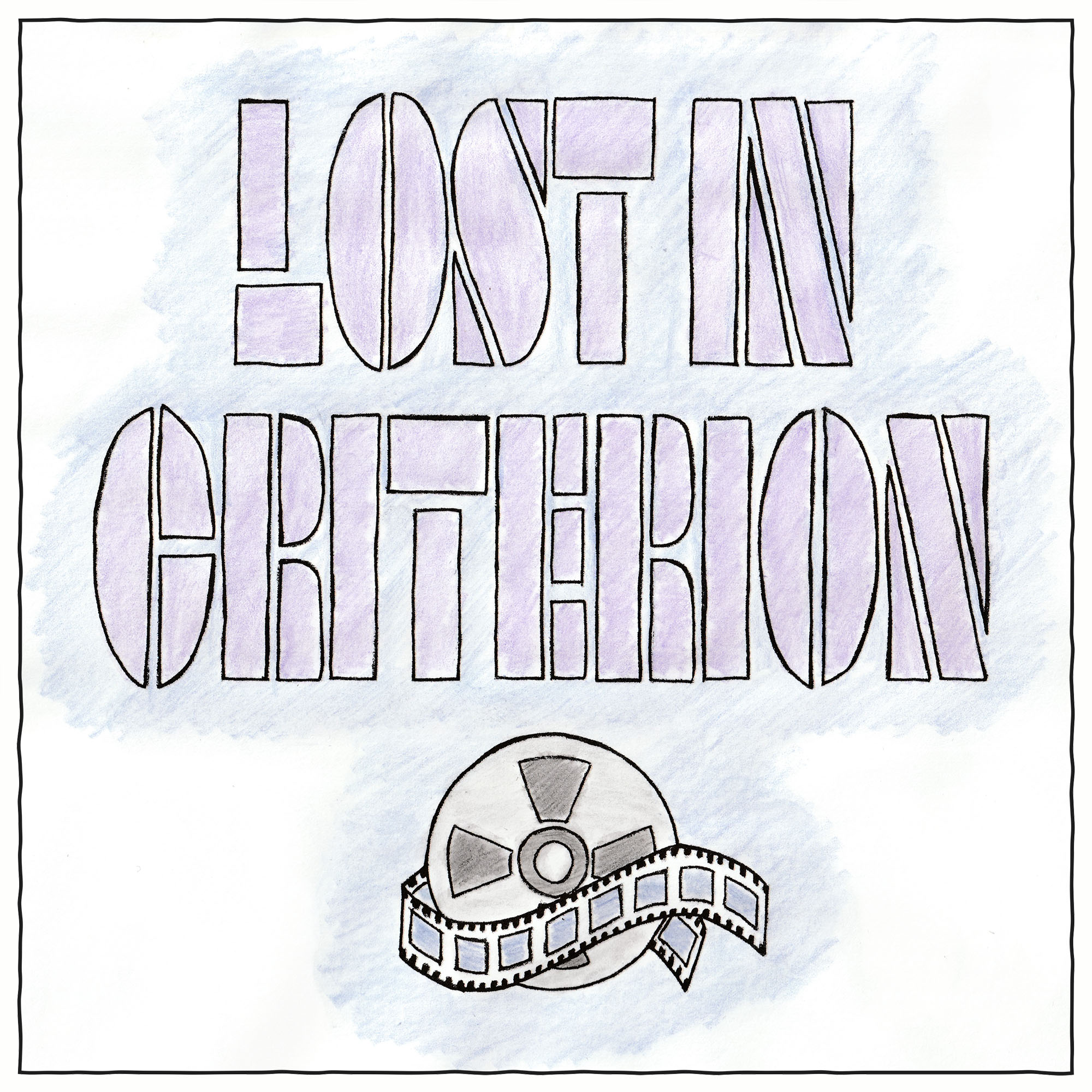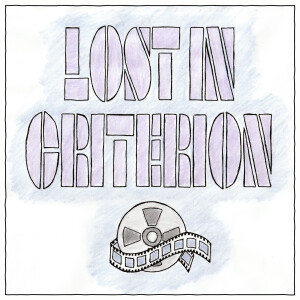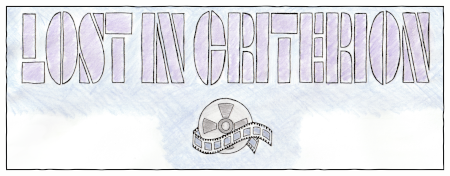
96.2K
Downloads
689
Episodes
The Adam Glass and John Patrick Owatari-Dorgan attempt the sisyphean task of watching every movie in the ever-growing Criterion Collection. Want to support us? We’ll love you for it: www.Patreon.com/LostInCriterion
The Adam Glass and John Patrick Owatari-Dorgan attempt the sisyphean task of watching every movie in the ever-growing Criterion Collection. Want to support us? We’ll love you for it: www.Patreon.com/LostInCriterion
Episodes

Friday Oct 23, 2020
Spine 424: Mafioso
Friday Oct 23, 2020
Friday Oct 23, 2020
Alberto Lattuada’s Mafioso is a black comedy about a dumb man who makes a bad promise while in the background his wife has a very sweet fish out of water story. It’s also about the people who progress leaves behind, and perhaps continues to leave behind. We also spend a little time talking about bridges, in particular the nearly inscrutable comparison image on the wikipedia page for the Akashi Kaikyō Bridge in Japan. Check it out: https://en.wikipedia.org/wiki/Akashi_Kaiky%C5%8D_Bridge

Friday Oct 16, 2020
Spine 423: Walker
Friday Oct 16, 2020
Friday Oct 16, 2020
Alex Cox went to Sandinista Nicaragua to film a biography of an 18th century American colonialist while the US was pretending to take the Iran-Contra scandal seriously. No wonder American critics hated the movie.

Friday Oct 09, 2020
Spine 422: The Last Emperor
Friday Oct 09, 2020
Friday Oct 09, 2020
Despite my false belief that Last Tango in Paris is in the Criterion Collection, The Last Emperor proves to be our last Bernardo Bertolucci movie for the foreseeable future. The tale of Puyi, crowned emperor of China at the age of 3, just before a half century of political revolution, and eventually dying of old age while working as a gardener at the Beijing Botanical Gardens. Bertolucci and the Chinese government may have different views of what that life trajectory means.

Friday Oct 02, 2020
Spine 421: Pierrot le Fou
Friday Oct 02, 2020
Friday Oct 02, 2020
Over the years it's become rather apparent that a lot of folks do not appreciate our opinions on Godard. Like Fellini we will not let our awareness of the issue lead us to change.

Friday Sep 25, 2020
Unspined: 4 by Varda: The Shorts
Friday Sep 25, 2020
Friday Sep 25, 2020
We finish off the Agnès Varda boxset with a talk on the short films packaged as bonus features: L'opéra-mouffe (1958), Du côté de la côte (1958), and the short narrative film contained within Cleo from 5 to 7, Les fiancés du pont Mac Donald.

Friday Sep 18, 2020
Spine 420: Le Bonheur
Friday Sep 18, 2020
Friday Sep 18, 2020
We couldn't be happier than to have guest Adam Spieckermann bring his insight to our discussion of Agnès Varda's Le Bonheur, a brightly colored relationship horror film.

Friday Sep 11, 2020
Spine 419: La Pointe Courte
Friday Sep 11, 2020
Friday Sep 11, 2020
We start the 4 by Agnès Varda boxset in medias res, or at the beginning after seeing the middle? This week we’re talking about La Pointe Courte, Varda’s first film but the third in the boxset. Why not talk about the first two? Because we have. This boxset contains two films, Vagabond and Cleo from 5 to 7, which we watched in much earlier episodes of Lost in Criterion in the times we don’t talk about except in apologetic tones of shame.

Friday Sep 04, 2020
Spine 417: This Sporting Life
Friday Sep 04, 2020
Friday Sep 04, 2020
Some of the best tragedy narratives indict a whole society for creating the system and the path that keep the tragic character imprisoned in his journey toward loss. There's a bit of that in This Sporting Life but the tragedy is focused on the main character's inability to court the woman he can't stop harassing, herself an even starker victim of the local political and economic system.

Friday Aug 28, 2020
Spine 416: Miss Julie
Friday Aug 28, 2020
Friday Aug 28, 2020
What Alf Slöberg’s 1951 film adaptation adds to August Strindberg’s 1888 play makes the film both more interesting and quite probably more infuriating. How fun.

Friday Aug 21, 2020
Spine 415: The Naked Prey
Friday Aug 21, 2020
Friday Aug 21, 2020
Who amongst us hasn't decided to solve a problem maybe without talking to anyone actually affected by the problem or even understanding what the problem is, so you just ended up doing something that adds to the problem in a different way?
The Naked Prey wants to solve racism. It does not.

Friday Aug 14, 2020
Spine 414: Two-Lane Blacktop
Friday Aug 14, 2020
Friday Aug 14, 2020
An experiment in what constitutes a movie finds James Taylor and Dennis Wilson partnered in a cross country race that resolves (or doesn't) sometime after the last reel burns up.

Friday Aug 07, 2020
Spine 413: Drunken Angel
Friday Aug 07, 2020
Friday Aug 07, 2020
Frequent guest Donovan H. joins us again, and he's maybe become more of an accelerationist than the last time he was on. We're talking Kurosawa's Drunken Angel, the famed director's first work with Toshiro Mifune.

Friday Jul 31, 2020
Spine 412: Sawdust and Tinsel
Friday Jul 31, 2020
Friday Jul 31, 2020
The earliest Bergman we've seen yet is the story of circus performers humiliated at every turn, and apparently something about the battle of the sexes.

Friday Jul 24, 2020
Spine 411: Berlin Alexanderplatz
Friday Jul 24, 2020
Friday Jul 24, 2020
Another week, another adaptation of a stream-of-consciousness novel about a perpetually drunk man, this time Fassbinder’s epic mini-series adaptation of Berlin Alexanderplatz. Taking place (and originally written) in Germany between the wars, it’s got some lessons for us.

Friday Jul 17, 2020
Spine 410: Under the Volcano
Friday Jul 17, 2020
Friday Jul 17, 2020
I finally actually counted and figured out this is episode 400. Too bad it's the story of a drunk white guy.

Friday Jul 10, 2020
Spine 409: Days of Heaven
Friday Jul 10, 2020
Friday Jul 10, 2020
We get our first taste of Terrence Malick in the collection with his tenuously Biblically-inspired period story of poor farm workers and a series of cons that don't really make sense.

Friday Jul 03, 2020
Spine 408: Breathless
Friday Jul 03, 2020
Friday Jul 03, 2020
I promise you there are Godard films we actually like.

Friday Jun 26, 2020
Spine 407: Mala Noche
Friday Jun 26, 2020
Friday Jun 26, 2020
Gus van Zant adapts an “autobiographical work” by Portland poet Walt Curtis, though also on the DVD is a documentary on Curtis by Bill Plympton which, to be honest, we’d probably rather talk about.

Friday Jun 19, 2020
Spine 406: Martha Graham: Dance on Film
Friday Jun 19, 2020
Friday Jun 19, 2020
It’s another Criterion curveball as we get a short inside-the-studio documentary on pioneering dancer Martha Graham and then two recordings of her pieces, all produced for PBS by Nathan Kroll.

Friday Jun 12, 2020
Spine 405: The Threepenny Opera
Friday Jun 12, 2020
Friday Jun 12, 2020
The argument of The Threepenny Opera is that under capitalism crime and legitimate business are indistinguishable in their exploitation.
As time marches on we can see that this is wrong. The system of exploitation perpetrated by “legitimate business”, protected by the police, and whose transactionary nature is thrust upon every aspect of society is the much worse crime.

Friday Jun 05, 2020
Spine 404: Robinson Crusoe on Mars
Friday Jun 05, 2020
Friday Jun 05, 2020
I think probably the most important thing I can share with you before going into this episode is that on the Criterion dvd is a Criterion-produced music video in which one of the films co-stars sings the plot synopsis.

Friday May 29, 2020
Spine 403: Cría Cuervos
Friday May 29, 2020
Friday May 29, 2020
Ana Torrent is back playing a weird little girl named Ana whose family is dealing with Francoist Spain in Carlos Saura's Cría Cuervos, a film that maybe pales in comparison to Spirit of the Beehive but also maybe stands on its own.

Friday May 22, 2020
Spine 402: The Milky Way
Friday May 22, 2020
Friday May 22, 2020
This week Pat and Adam get very lost in Luis Buñuel's The Milky Way (1969), wondering mostly who Buñuel was making the film for, as its philosophical elements are so esoteric as to be off-putting. The sword fight is pretty neat, though.

Friday May 15, 2020
Spine 401: Night on Earth
Friday May 15, 2020
Friday May 15, 2020
Jim Jarmusch explores humanity through the connections of taxi drivers and riders and emulating the film history of various places on "earth", which is to say New York, LA, Paris, Rome, and Helsinki.

Friday May 08, 2020
Spine 400: Stranger than Paradise
Friday May 08, 2020
Friday May 08, 2020
Friend of the show and theme song composer Jonathan Hape joins us to celebrate Spine 400! Someday we may finish this!
